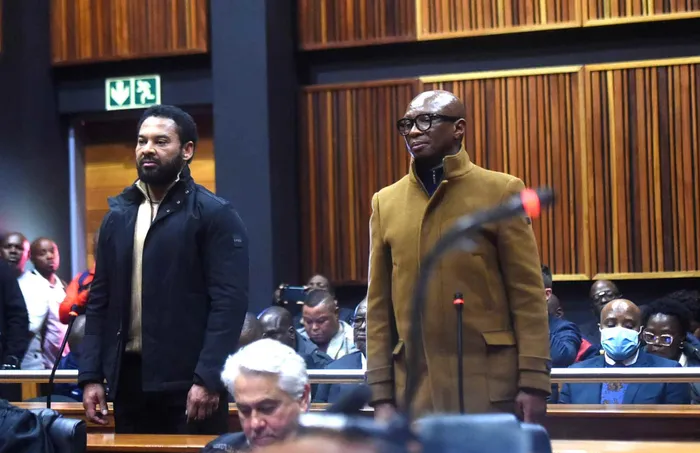Zizi Kodwa and Jehan Mackay’s corruption case postponed to November 1

The corruption case against former sports minister Zizi Kodwa and co-accused Jehan Mackay has suffered yet another postponement at the Palm Ridge Magistrate’s Court. Picture: Itumeleng English / Independent Newspapers
The corruption case involving former minister Zizi Kodwa and businessman Jehan Mackay has hit another snag, as proceedings were once again postponed, this time to November 1.
The delay comes amid reports that the Director of Public Prosecutions (DPP) is still deliberating on whether to accept the duo’s bid to have their charges dismissed.
The prolonged nature of this high-profile case has raised eyebrows, particularly since details emerged earlier this month regarding a proposed court date of October 24, set by Magistrate Philip Venter.
The magistrate had assured all parties of a fast-tracked process, despite the various setbacks that have plagued the case thus far.
However, as the matter continues to drag on, it appears that the alleged misconduct by the involved parties remains unresolved.
Kodwa is accused of receiving bribes totalling R1.7 million from Mackay, a former executive of the IT service management company EOH.
The illicit payment was allegedly made in exchange for facilitating government tenders, emphasising the gravity of the allegations and the potential impact on public trust in government institutions.
During a brief court appearance at Palm Ridge Magistrate’s Court on Thursday, a decision on the application to withdraw charges was anticipated but not delivered.
Phindi Mjonondwana, spokesperson for the National Prosecuting Authority (NPA), explained that the case was experiencing delays due to extensive consultations required when handling such representations.
Mjonondwana noted that the DPP’s prosecutors must consider the evidence in the docket and coordinate with the previous prosecutor before arriving at any conclusions concerning the case.
“What we need to understand and take into consideration is that when one makes representations and it reaches the office of the DPP, the person dealing with the submissions will be engaging with the evidence for the first time and will also require a report from the prosecutor that decided to prosecute,” she said.
The Star
siyabonga.sithole@inl.co.za